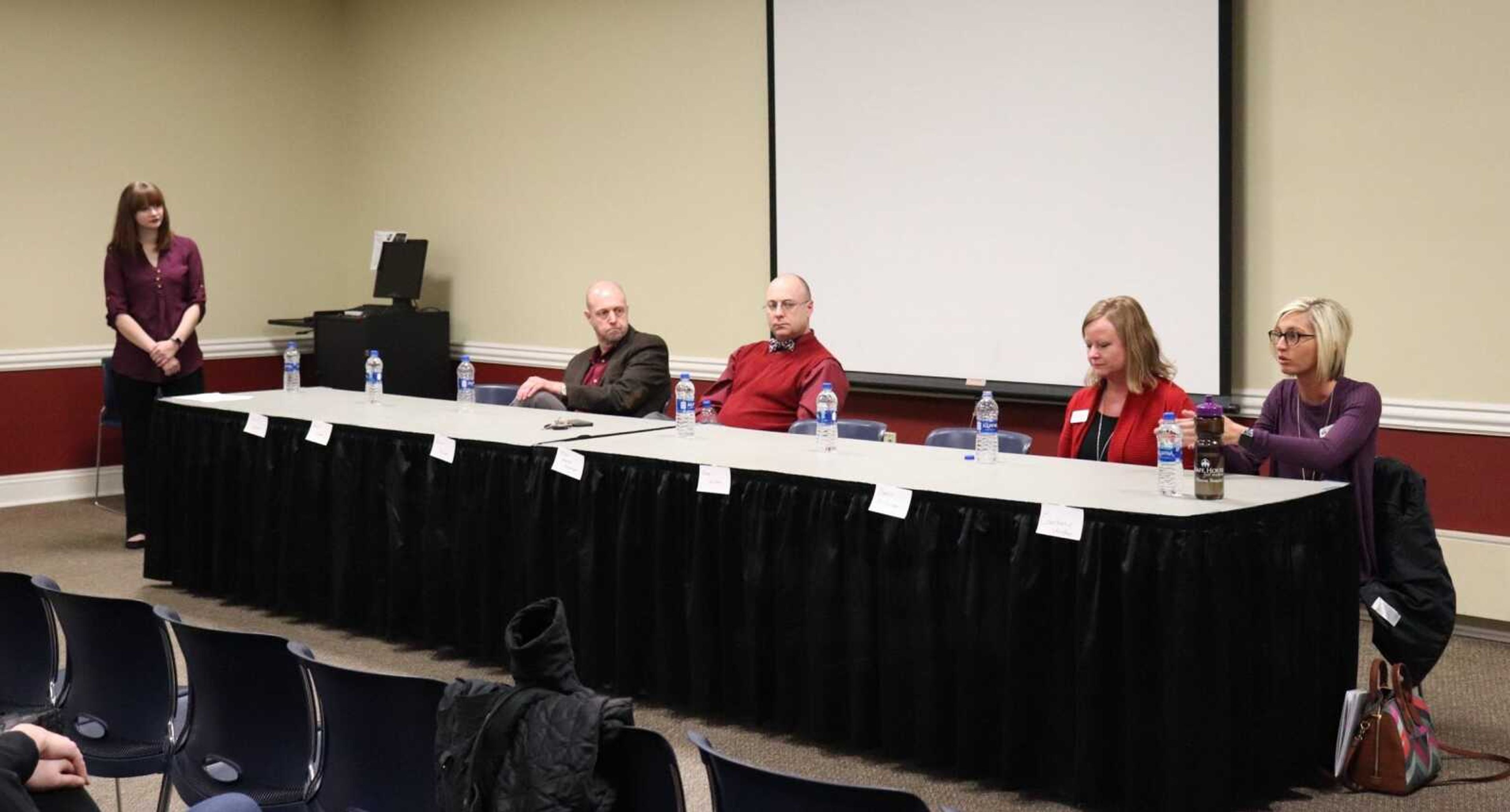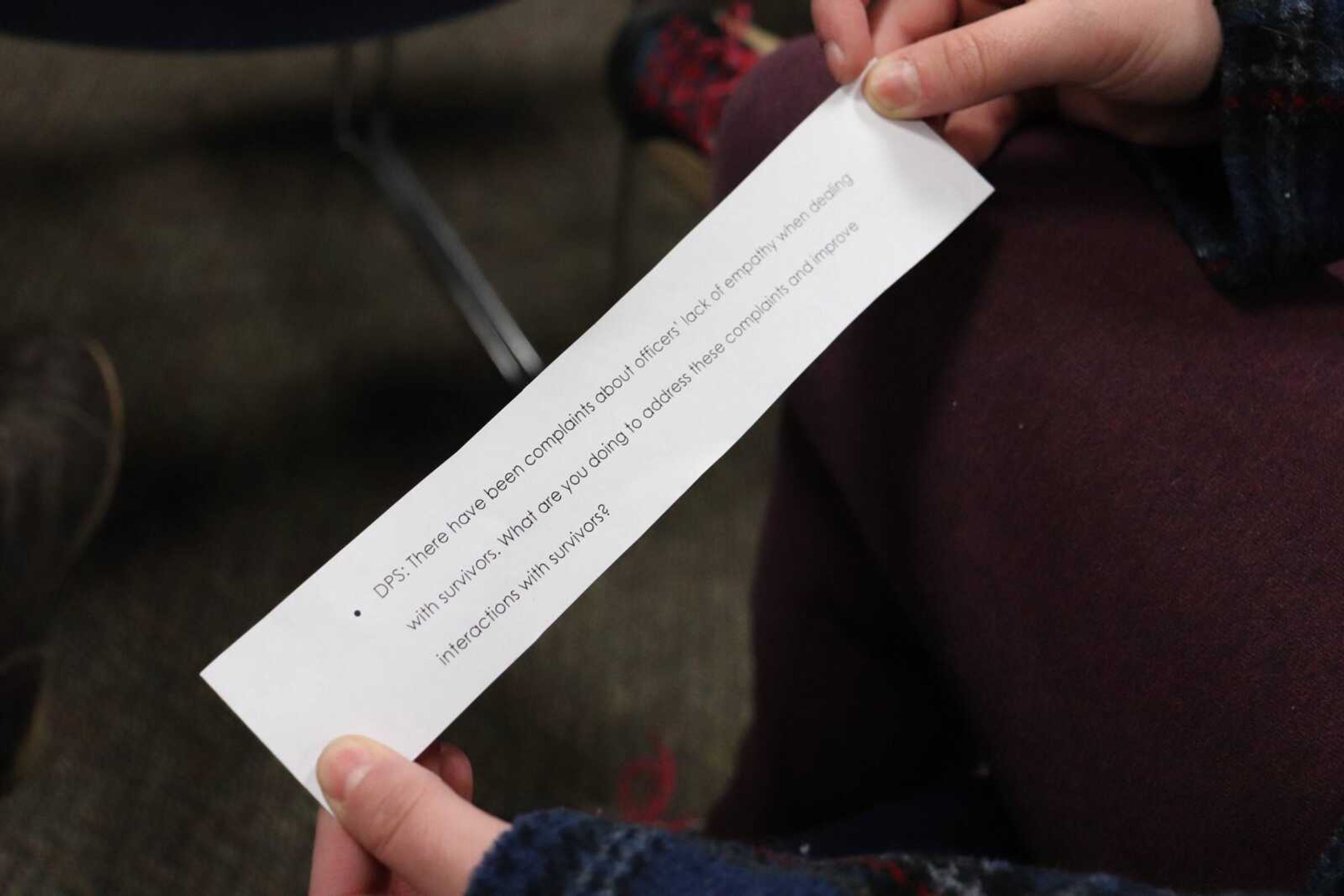Sexual assault panel provides forum between students, administrators
What started out as a school project turned into a public forum that brought students and staff together in the University Center Redhawks room on Monday to address one national topic — sexual assault. Southeast senior Jessica Strunk hosted a panel on sexual assault for her academic distinction project in order to provide an outlet for people who had been sexually assaulted to ask any unanswered questions to university officials...
What started out as a school project turned into a public forum that brought students and staff together in the University Center Redhawks room on Monday to address one national topic — sexual assault.
Southeast senior Jessica Strunk hosted a panel on sexual assault for her academic distinction project in order to provide an outlet for people who had been sexually assaulted to ask any unanswered questions to university officials.

The panel consisted of assistant dean of students Randy Carter, associate vice president for student life Bruce Skinner, campus violence prevention coordinator Donna St. Sauver and prevention education adviser at the Safe House for Women Courtanie Vaughn.
With approximately 20 people in attendance, the discussion dug into the current state of sexual violence on Southeast’s campus, and moving forward, what the university is doing for the cause.
St. Sauver said a large part of her job is to give sexual assault victims a platform to have their voices be heard.
“The best thing we can do for survivors is amplify their voices,” St. Sauver said. “This isn’t just a news story, a #MeToo movement, this is personal and it’s on our campus.”
With the push to amplify the voices of survivors, some victims say that they still feel victim-blamed, or that prevention efforts are not enough to stop sexual violence.
“What are you going to do to better your language when talking about prevention, to not victim-blame people who have been sexually assaulted?” Southeast sophomore Kate Riney asked Carter.
Riney said she attended a presentation to all of Greek Life where Carter used a real-life sexual assault case at the university as an example of what not to do when preventing sexual violence while the victim he was talking about was in the crowd.
Carter said as an educator he is faced with walking the fine line of risk prevention and victim-blaming, but does not recall making the comment Riney was referring to.
“You actually said ‘How could you go out and take 19 shots on your 19th birthday? How could you be so naďve?” Southeast sophomore Kyleigh Williamson said in reply to Carter.
Williamson had taken 19 shots on her 19th birthday, and was later sexually assaulted in her dorm by the sober driver who took her home. She believes Carter was referring back to her case, which was ongoing during the time he gave the presentation.
“The conversation needs to be reversed from ‘preventing rape’ to ‘don’t rape’,” Riney said.
The focus on sexual assault, St. Sauver said, needs to more focused on the perpetrators’ behaviors, and less on the victim’s behavior.
President of Redhawks Rising Mahala Landeros used other crimes as a metaphor relating to sexual assault.
“Everyone knows kidnapping is wrong, everyone knows murder is wrong, and guys may say rape is wrong — but they are the same people high-fiving each other for getting drunk and sexually assaulting a woman,” Landeros said.
Far too often, St. Sauver said, criminal behavior is excused for “just being boys.”
When talking about improvements that could be made at Southeast, audience members named a few: Greek Life education, communication within the judicial process, and a more empathetic system to assist in reversing the stigma.
One concern discussed at the panel was the correlation between Greek Life and sexual assault, and what the university is doing to remedy the problem.
Carter said Greek Life is no more responsible for sexual assaults than any other organization on campus, however, they have made an emphasis on educating those students on consent and prevention. Skinner, though, doesn’t know if education will ultimately stop all sexual assaults within the Greek Life community.
“Even if you touched on that weekly, it wouldn’t do anything,” Skinner said. “Removing them from our community would be much more effective.”
He said that to effectively handle sexual-assault allegations at the university level, they have to be informed of what happened. He said in most recent years, the university has become stricter in sanctioning perpetrators at an organizational level.
“We have removed and suspended fraternities for allegations of sexual assault. That’s a change within the past 36 months,” Skinner said. “When you tell [an organization] they are gone, that has a ripple on their community.”
Overall, the panel stressed the usage of university resources to victims of sexual assault, and encouraged others to empower survivors to report what has happened to them.
St. Sauver believes it takes a village to promote change regarding sexual assault.
“It’s not what we are doing, it’s about what we all are doing,” St. Sauver said.







